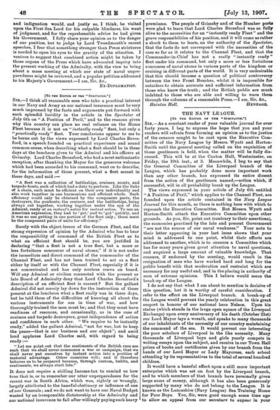[To TEC EDITOR OF TIER " SPECTATOR.1
think all reasonable men who take a practical interest in our Navy and Army as our national insurance must be very
much impressed by the facts and arguments put forward with such splendid lucidity in the article in the Spectator of
July 6th on " A Position of Peril," and to the reasons given
why this country can place no real reliance on the Home Fleet because it is not an "instantly ready" fleet, but only a " practically ready" fleet. Your conclusions appear to me to be borne out by the views expressed by Lord Charles Beres- ford, in a speech founded on practical experience and sound common-sense, when describing what a fleet should be in these days at the luncheon given to the•Admiral and his officers at
Grimsby. Lord Charles Beresford, who had a most enthusiastic reception, after thanking the Mayor for the generous welcome which had been accorded to his command, went on to describe, for the information of those present, what a fleet meant in these days, and said :—
"A fleet was a collection of battleships, cruisers, scouts, and torpedo-boats, each of which had a duty to perform. Like the links of a chain, each must be efficient on their own individuality and also work together in one harmonious and efficient whole. Such efficiency could only be obtained by the component parts, the destroyers, the gunboats, the cruisers, and the battleships, being always out together, working together under the eye of the Admiral, ready at an instant's notice for instant action. To use an American expression, they had to get,' and to `get' quickly, and it was no use getting in one portion of the fleet only ; these must be the component parts of units for efficiency."
Surely with the object-lesson of the German Fleet, and the strong expression of opinion by the Admiral who has to bear
the responsibility of command of the British Fleet as to what an efficient fleet should be, you are justified in declaring " that a fleet is not a true fleet, but a more or less fortuitous concourse of naval atoms," if it is not under the immediate and direct command of the commander of the Channel Fleet, and has not been trained to act as a fleet
either by itself or with the Channel Fleet, especially if it is not concentrated and has only nucleus crews on board. Will any Admiral or civilian connected with the present or late Board of Admiralty deny that Lord Charles Beresford's description of an efficient fleet is correct ? But the gallant Admiral did not merely lay down for the instruction of those present at the luncheon what a fleet really was in these days, but he told them of the difficulties of knowing all about the various instruments for use in time of war, and how thoroughly trained the men must be; and that they must have readiness of resource, and occasionally, as in the case of cruisers and torpedo destroyers, great independence of action and confidence in each other. " We require to be instantly ready," added the gallant Admiral, "not for war, but to keep the peace—that is our business and our object"; and amid loud applause Lord Charles said, with regard to being ready
" Let me point out that the sentiments of the British race are such that we shall never commence a war or campaign, that we shall never put ourselves by instant action into a position of material advantage. Other countries will; and it therefore behoves us to be prepared because„ through custom, habits, and sentiments, we always start late."
It does not require a shilling Income-tax to remind us bow true that is, or to remember our utter unpreparedness for the recent war in South Africa, which was, rightly or 'wrongly, largely attributed to the baneful obstinacy or influence of one of our Generals ; and we do not want to have our Naval Budget wasted by an irresponsible dictatorship at the Admiralty and our national insurance to fail after willingly payingsuch heavy premiums. The people of Grimsby and of the Humber ports were glad to learn that Lord Charles Beresford was so fully alive to the necessities for an "instantly ready Fleet" and the grave responsibilities of his position, and it will come as rather a shock to them to learn, on the authority of the Spectator, that the facts do not correspond with the necessities of the case so far as it relates to the Channel Fleet, and that the Commander-in-Chief has not a really " instantly ready" fleet under his command, but only a more or less fortuitous concourse of naval atoms in various ports of the kingdom or cruising in different parts of the world. It is very undesirable that this should become a question of political controversy between the two Front Benches, whilst it is impossible for outsiders to obtain accurate and sufficient information from those who know the truth ; and the British public are much indebted to those who are able and willing to warn them through the columns of a reasonable Press.—I am, Sir, &e.,






































 Previous page
Previous page